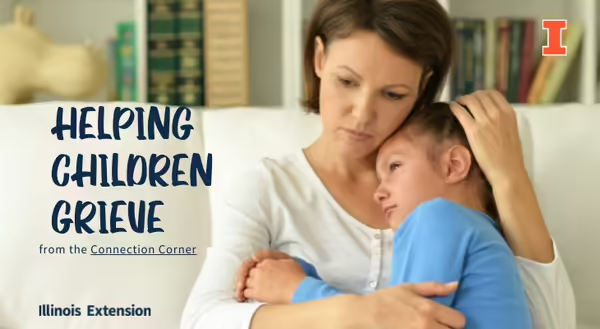
In 2016, August 30 was established as National Grief Awareness Day to raise awareness about the variety of ways that people cope with loss and to promote resources to support people who are grieving.
Children who have lost a family member, friend, or pet can experience various level of sadness and grief. It can often be difficult for parents and caregivers to know to know what to say or do to help. The National Alliance for Children’s Grief has some ideas to help provide support and compassion for children dealing with grief.
- Be honest with the child. Discuss the loss in a simple and age-appropriate way. Provide clear and honest responses to their questions. This builds trust and lets them know they can come to you with more questions as they may have them.
- Listen when they want to talk. Be mindful that children’s way of dealing with their grief will vary, including when and how they want to talk about it. Some children may feel better talking, while others may use music or writing to express their grief.
- Acknowledge their grief. It is important to meet them where they are in the process and let them know it is ok to express in his or her own way. Feelings of sadness, anger, frustration, and fear are all normal, as is moving from one emotion to another and then back again.
- Share. Talk to them about times you have experienced a loss and what emotions you were feeling. Tell them what you learned and what things helped you along the way, but also remember they may have a very different process of grieving.
- Create rituals and new family traditions. Family traditions with the loved one can be one of the most challenging things for children as they are going through losing someone close to them. When possible, try to create a ritual that honors the family members and creates an opportunity for new traditions.
- Be patient. The process of grieving is not a linear process. Emotions and feelings of intense loss can come and go over time. Children often repeat questions or statements as they are grieving, especially if they are not old enough to understand the finality of death. Certain events or times of the year may also bring emotions back to the surface. Spend time with your child as they ask questions.
Although there is no one simple way to help a child through the grieving process, these suggestions can help you maintain open communication and also help you to support them in whatever the grieving process looks like for them.
MEET THE AUTHOR
Judy Schmidt provides leadership to 4-H metro programming in Peoria County. Schmidt joined Extension in 2001, working as a Youth Development Educator at the East Peoria Center and joined the Fulton-Mason-Peoria-Tazewell unit in 2011. Her work focuses on 4-H youth development programming in the local metropolitan area, specifically leading positive youth development initiatives for after-school programs, community groups, 4-H clubs and other youth-serving organizations. Her areas of expertise include positive youth development principles, youth leadership, and work with teens as teachers.
Schmidt attended the University of Illinois at Urbana-Champaign for her bachelor's degree in psychology and also for her master's degrees in Social Work and Marriage and Family Therapy. She is a certified facilitator of the Matrixx System/Real Colors program by the National Curriculum and Training Institute.
ABOUT THE BLOG
Connection Corner: is a blog that provides timely information, activities, and resources to help you stay connected to loved ones, the world around you, and yourself.